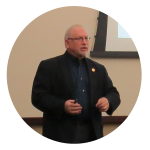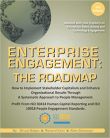Guest Viewpoint: Why Employee Commitment Is Critical to Improving Employee Experience
The concept of employee engagement has been the default approach to employee experience (EX) for close to 40 years, and its strengths and challenges have become especially pertinent in this age of The Great Resignation.
Many brands, especially those that had insufficiently invested in employee support and contribution during the pandemic, are now scrambling to develop policies and programs aimed squarely at addressing employee needs so that they don’t fall victim to the unprecedented churn transforming the job landscape.
These policies and programs, and the drive to update them, are conventionally seen as the apex of employee experience creation. The reality, however, is that there is another, much more contemporary and action-centered EX concept that every enterprise should embrace as its focus for achieving Experience Improvement (XI) for its employees. That concept is employee commitment, and it’s a paradigm shift in how organizations must address employee needs and wants. Here, I’ll describe not only how significantly employee commitment differs from engagement, but also why it’s essential for your organization to embrace a commitment mindset if your objective is to create meaningful human connection and role contribution with employees.
Defining Employee Engagement
As introduced above, employee engagement is principally a set of policy-focused processes.
The brands and EX teams dedicated to developing and executing employee engagement see their responsibilities as building programs that a) listen to employees, b) gather feedback, and
c) distill actionable insights and develop initiatives from all that data. The overarching goal of engagement, then, is simply to meet foundational employee job needs.
Other factors that set engagement apart from employee commitment include hard and soft costs. Many organizations measure engagement solely in monetary terms. The hard numbers are certainly important, and there is some evidence (though inconsistent) that engagement measures impact business outcomes. That said, reducing employees to a set of numbers is one of engagement’s key drawbacks, and engagement has largely failed to stem the flow and rate of employee churn. It also falls short of what companies can attain (culturally and operationally) with employee commitment.
Defining Employee Commitment
Whereas employee engagement’s boundaries are derived by its focus on numbers and its more reactive conceptual philosophy, employee commitment is more holistic and progressive. Rather than dealing with employee performance improvement as policy modification, commitment is about driving supportive enterprise culture through transparency, trust, and communication. It recognizes the need for employees to have an emotional connection to the organization and its purpose, not just general job satisfaction.
Additionally, and perhaps most importantly, commitment encourages organizations to demonstrate how (and how effectively) all employees, not just those who are customer-facing, impact customers’ behavior and help forge meaningful relationships wherever customer and company intersect.
At this point, it’s important to communicate that employees have sought this exact cultural and organizational dynamic for quite some time. The Covid-19 pandemic did not precipitate The Great Resignation—it merely accelerated employees’ desire for roles and employer cultures built on deeper connection and meaning. And, as we’re seeing with the current, unprecedented churn, it’s clear that far too many brands failed to adequately support and encourage commitment (let alone invest in even basic employee engagement). This is why it’s all the more urgent and imperative that organizations transition to commitment, building beyond engagement in their core employee experience strategy.
Employee commitment is, indeed, a more progressive and actionable EX construct.
Why Employee Commitment Matters So Much
A fundamental reason brands need to pursue employee commitment rather than just engagement is that building trust, connections, and relationships drives much more value for both employees and customers. Committed employees are seen as contributory assets, which facilitates pride and a sense of ownership that enables them to see how their performance is directly benefiting both themselves and their employer. This is a well-proven philosophy that can be embraced throughout a company rather than staying siloed in any one group or department.
Finally, and perhaps most importantly, commitment is about seeing employees as stakeholders and collaborators instead of just necessary costs of doing business. That differentiation goes a long way toward driving behavior which, in turn, catalyzes both retention and an array of other positive business outcomes. Organizations that can achieve and sustain employee commitment will benefit not only from improved overall performance and business outcomes, but also from a more stakeholder-centric culture and processes. Employees will return the favor of this transition with greater contribution, greater ongoing value creation, and a much more honed customer focus. Above all, remember to view employees as stakeholders and collaborators in this process instead of just a cost. They’ll appreciate that distinction.
About the Author
Michael Lowenstein is Senior Director, Employee Experience Consulting, for InMoment.
Click here to get ESM news delivered each week.
Master the “S” of Environmental, Social, Governance (ESG), A.k.a. Stakeholder Capitalism
The Enterprise Engagement Alliance at TheEEA.org is the world’s first and only organization that focuses on outreach, certification and training, and advisory services to help organizations achieve their goals by fostering the proactive involvement of all stakeholders. This includes customers, employees, distribution and supply chain partners, and communities, or anyone connected to an organization’s success.
Training and Thought Leadership
- Founded in 2008, the Enterprise Engagement Alliance provides outreach, learning and certification in Enterprise Engagement, an implementation process for the “S” or Social of Stakeholder Capitalism and Human Capital Management and measurement of engagement across the organization.
- The Enterprise Engagement Alliance provides a training and certification program for business leaders, practitioners, and solution providers, as well as executive briefings and human capital gap analyses for senior leaders.
- The EEA produces an education program for CFOs for the CFO.University training program on Human Capital Management.
- Join the EEA to become a leader in the implementation of the “S” of ESG and Stakeholder Capitalism.
- The ESM information portal and The Enterprise Engagement Advisors Network solution provider marketplace cover all aspects of stakeholder engagement, and the EEA information library lists dozens of resources.
- The RRN information portal and Brand Media Coalition marketplace address the use of brands for gifting, incentives, recognition, and promotions. The BMC information library provides information and research resources.
Video Learning
The EEA Human Capital Management and ROI of Engagement YouTube channel features a growing library of 30- to 60-minute panel discussions with leading experts in all areas of engagement and total rewards.
- Enterprise Engagement for CEOs: The Little Blue Book for People-Centric Capitalists. A quick guide for CEOs.
- Enterprise Engagement: The Roadmap 5th Edition implementation guide. A comprehensive textbook for practitioners, academics, and students.
Enterprise Engagement Advisory Services
The Engagement Agency helps:
- Organizations of all types develop strategic Stakeholder Capitalism and Enterprise Engagement processes and human capital management and reporting strategies; conduct human capital gap analyses; design and implement strategic human capital management and reporting plans that address DEI (Diversity, Equity, and Inclusion), and assist with managed outsourcing of engagement products and services.
- Human resources, sales and marketing solution providers profit from the emerging discipline of human capital management and ROI of engagement through training and marketing services.
- Investors make sense of human capital reporting by public companies.
- Buyers and sellers of companies in the engagement space or business owners or buyers who seek to account for human capital in their mergers and acquistions.
For more information: Contact Bruce Bolger at Bolger@TheICEE.org or call 914-591-7600, ext. 230.
















